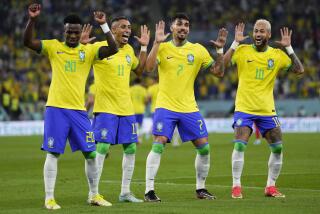Frenchman’s Goal: Victory, Not Revenge : Battiston, a Victim of German ‘Keeper Schumacher in 1982, Is Back Again
- Share via
GUADALAJARA — To fully understand the emotions that will be swirling around Jalisco Stadium here this afternoon when France plays West Germany in the semifinals of the World Cup soccer tournament, it is necessary to turn the clock back four years.
In the semifinals of the 1982 tournament in Spain, there occurred in one devastating moment an incident that entirely altered the course of the World Cup.
The game in question was played in Seville, and the players most directly involved were West German goalkeeper Harald (Toni) Schumacher and French defender Patrick Battiston.
Brian Glanville of London’s Sunday Times picks up the story. This was his description of the moment:
The match may be said to have turned on a horrifying incident in the 57th minute. At that point the score was level at 1-1, as it would be till extra time. Patrick Battiston, who had just come on as a substitute for Bernard Genghini, raced through the middle on to a beautifully executed pass, which turned the defense. Out of his goal raced the burly Schumacher. Battiston beat him to the ball, but Schumacher thundered into him, brutally smashing him to the ground with a blow of the forearm and callously leaving him, minus two teeth, so badly hurt that there were fears he would die; fears compounded by the idiocy of the Seville police who had banned the Red Cross from the pitch (field). Battiston had to lie there for three long minutes before he could be treated. It was this incident, above all, which would make the most neutral of observers supporters of Italy in the World Cup Final. No penalty was given. Schumacher should undoubtedly have been sent off, which would almost surely have condemned the Germans to defeat, but Jan Corver, the Dutch referee, had not seen the incident, and his linesman, incomprehensibly, did not enlighten him. Instead, the game went on as if nothing had happened. Regulation time ended with the score still tied at 1-1, but the French managed to take a 3-1 lead during extra time and it appeared that victory and a spot in the championship game were theirs.
The West Germans are never quite so dangerous as when they trail, however, and they fought back to tie the game, 3-3, then advanced to meet Italy in the final by winning on penalty kicks, the match becoming the first in any World Cup to be settled that way.
In one of sports’ many ironies, the teams are facing each other again in the semifinals, both having reached this stage on penalty-kick victories in the quarterfinals.
At noon (11 a.m. PDT), Schumacher and Battiston will again be on opposite sides of the field. As far as Battiston is concerned, that’s where they will stay.
“I don’t plan to get close to Schumacher, no closer than 40 meters,” he said earlier this week. “And this time I will be more careful. I have paid my dues.”
The remark was made at least partly in jest, however, and Battiston is eager to have his French teammates concentrate their energies on winning rather than dwell on what happened four summers ago.
“The foul is in the past, forgiven and forgotten,” he said. “My greatest wish is that the next match be played with a spirit of chivalry and of sports. We must not think of taking revenge over what happened in Seville, but in reaching the final match of this World Cup.”
For Schumacher, however, it has been next to impossible to erase the memory of the foul that broke Battiston’s jaw and left him hospitalized for several weeks and out of the game for at least six months.
The West German goalkeeper might have escaped punishment at the time, but he has had to live with the consequences ever since. As London’s World Soccer magazine said earlier this year:
It is perhaps a sad reflection of current attitudes to sport that Schumacher may not be remembered worldwide for being one of the greatest goalkeepers Germany has produced, but rather for one gruesome act of folly, which will undoubtedly haunt him for the rest of his career. His reckless charge on the Frenchman Patrick Battiston ... has probably received more publicity and exposure in the media than any other intervention by a goalkeeper in the history of football. Schumacher’s own character is partly to blame for that fact. Even at the time, he could not admit that he had done wrong. He visited Battiston in hospital shortly after the incident, but his apology sounded less than sincere to the Frenchman.
“I hate making mistakes,” Schumacher told World Soccer. “Had I shown remorse immediately, it would have amounted to an admission of error. I just can’t bring myself to expressing regret. I always say what I think, irrespective of whether it suits others or not.”
Apparently, the West German goalkeeper, who has played for Cologne in the Bundesliga since he was 18, still has not learned to temper his remarks or his actions.
Shortly before the West German team left for Mexico, Schumacher, 32, criticized Coach Franz Beckenbauer’s methods of handling the team and the two got into a furious argument, Beckenbauer threatening to drop Schumacher from the squad.
No sooner was that problem resolved than Schumacher was again making news, this time for a brutal foul on his own teammate, Mathias Herget, during a training session in Morelia, Mexico.
Herget came away with an injured knee, and Beckenbauer said afterward that Schumacher’s tackle would have been difficult to understand even in a competitive match, let alone an intrasquad scrimmage.
Still, West Germany has yet to produce a competent successor to Schumacher, whose penalty kick heroics in the quarterfinal against Mexico at Monterrey last Saturday earned the West Germans their semifinal berth.
France is favored to win today, thus setting up a France-Argentina title game if, as expected, the Argentines can get past Belgium this afternoon in the other semifinal at Mexico City.
That would mean Michel Platini against Diego Maradona--the best in Europe against the best in South America, with the winner rightfully being called the best in the world.
World Cup Notes French Coach Henri Michel said Tuesday that striker Dominique Rocheteau will miss the game against West Germany because of an injured right knee. . . . The West Germans, too, will be without one of their forwards since Thomas Berthold was ejected from the match against Mexico and has a one-game suspension. . . . French defender Maxime Bossis, whose missed penalty kick in 1982 gave West Germany its semifinal win, said of today’s game: “If we must end with a series of penalties, don’t count on me.” . . . Argentine Coach Carlos Bilardo came as close as he probably will ever get to admitting that Diego Maradona had illegally handled the ball when he scored Argentina’s first goal against England last Sunday. Said Bilardo: “I would not dare to say he used his hand, but maybe he felt guilty and therefore scored the second goal.” . . . Belgium is the underdog today, and its tactic will be to defend in numbers and hope for a breakaway goal. Argentina, meanwhile, will follow Maradona’s advice. “We will attack,” he said. “We do not know any other way.”
The Brazilians, eliminated by the French on penalty kicks in last Saturday’s quarterfinal, now want France to win the tournament. Said midfielder Junior, 32, after the loss to France: “For a whole generation, the last hope of winning the World Cup has gone out the window. It’s so cruel. This was the crunch match, the real final. France must win the trophy now.” . . . Two plaques will be unveiled at Azteca Stadium in Mexico City Friday, one commemorating the scissors-kick goal scored by Mexico’s Manuel Negrete against Bulgaria and the other honoring Maradona’s second goal against England. The two goals are judged to have been the best scored in the stadium during the tournament.
More to Read
Go beyond the scoreboard
Get the latest on L.A.'s teams in the daily Sports Report newsletter.
You may occasionally receive promotional content from the Los Angeles Times.






